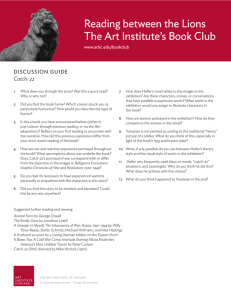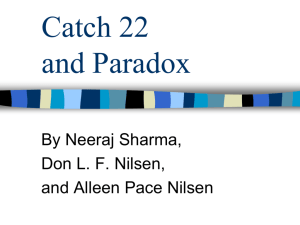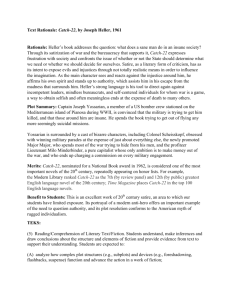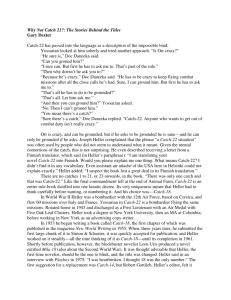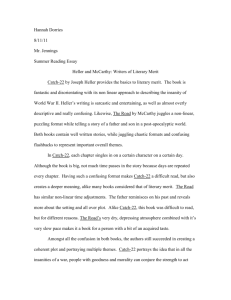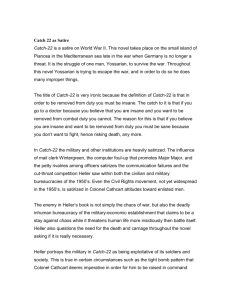Kathi A. Vosevich - War, Literature & the Arts
advertisement
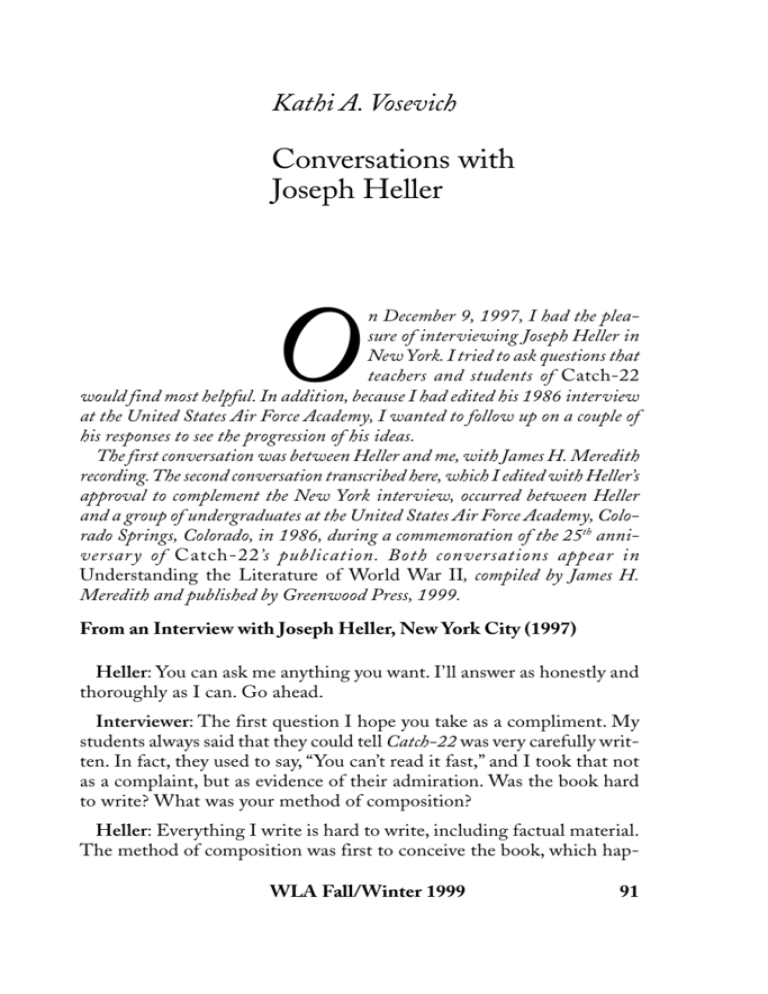
Kathi A. Vosevich Conversations with Joseph Heller O n December 9, 1997, I had the pleasure of interviewing Joseph Heller in New York. I tried to ask questions that teachers and students of Catch-22 would find most helpful. In addition, because I had edited his 1986 interview at the United States Air Force Academy, I wanted to follow up on a couple of his responses to see the progression of his ideas. The first conversation was between Heller and me, with James H. Meredith recording. The second conversation transcribed here, which I edited with Heller’s approval to complement the New York interview, occurred between Heller and a group of undergraduates at the United States Air Force Academy, Colorado Springs, Colorado, in 1986, during a commemoration of the 25th anniversary of Catch-22’s publication. Both conversations appear in Understanding the Literature of World War II, compiled by James H. Meredith and published by Greenwood Press, 1999. From an Interview with Joseph Heller, New York City (1997) Heller: You can ask me anything you want. I’ll answer as honestly and thoroughly as I can. Go ahead. Interviewer: The first question I hope you take as a compliment. My students always said that they could tell Catch-22 was very carefully written. In fact, they used to say, “You can’t read it fast,” and I took that not as a complaint, but as evidence of their admiration. Was the book hard to write? What was your method of composition? Heller: Everything I write is hard to write, including factual material. The method of composition was first to conceive the book, which hapWLA Fall/Winter 1999 91 92 WLA Fall/Winter 1999 pened very quickly. The idea of the book really, truly came to me overnight, and I wrote the first chapter the next morning. At that time and to this day, I write in longhand. And now I’m resigned to the fact that when I write in longhand, I can write for only one hour or two, and I hope to get the equivalent of one type-written page down at the first pass. I work on a lined pad—not legal-sized—letter-sized, and I try to get three hand-written pages done. I rewrite sentences. Then when I have a batch of these pages, for fear of losing them in a fire, I put them on the word processor, and I rewrite that. Then when I have a chapter done, I rewrite that chapter on the word processor, then I rewrite it again. It’s very slow and tedious. I used to get infuriated with myself, and Catch22, because I would work only evenings—I had other jobs and no time to write—but it was still the same thing. I would only write two or three pages a night. I would try to speed it up, and then write ten pages a week, then I wouldn’t like it. I would have to rewrite, so it averaged to a page a night. Then when the book was done, Catch-22 was about 60 or 80 pages too long, and I had to cut it. Interviewer: I think it was in a Playboy interview you said you cut about 100 pages. And the interviewer said of what, and you said, “adjectives and adverbs.” Heller: Yeah, almost no incidents. There were two chapters that were cut—each of them was first published in Playboy. Neither one was a significant incident. The cutting was done at the suggestion of an editor. They interrupted—they were merely funny or satirical and not contributing to any flow of the action. Interviewer: Do you write every day? Heller: When I’m writing, I like to write every day. I’ve never had a compulsion to write. I’m easily distracted. I can stop to go out to dinner or go to the movies. That’s always been true. What’s happened since the second novel, Something Happened, I haven’t had to work at anything, and I have days free. I am happiest when I’m writing, and I have something to focus on. Interviewer: Are you working on the sequel to Now and Then [Heller’s memoirs published in 1998]? 93 Heller: That’s misleading. The reference to a sequel [in the memoirs] was intended to be jocular. I don’t know what else to write that’s worth writing about myself. Interviewer: You said that writing isn’t a compulsion or obsession for you (like it was for Hemingway who seemed obsessed by writing). Is it more of a business? Heller: Well, I wanted to write this memoir. I had something to write about, I felt. I can’t think of much I left out. I’ve not had an adventurous life, and certainly not since World War II, but that’s known. There are very few adventurous experiences I’ve had. In my memoirs, I tried to deal with my experiences that are unknown and with my closest friendships. Interviewer: Your friendships do come out in the book. Beside yourself, they are the stars of the book. Heller: Yes, the fact that a lot of my friends are big celebrities, like Mel Brooks, isn’t all that significant to me because they are great friends and that’s all that matters. Interviewer: I haven’t seen you answer this question anywhere. Which writers do you think have been most influenced by you and which use you as their model? Heller: I would not say that about any writer I know of. What did happen with Catch-22 was a movement, in this country and in Europe, to change the traditional form of the novel. These writers were acting simultaneously, those in this group, without having contact with each other. Thomas Pynchon who was writing V at the time was one of those writers. Although we had the same editor, he did not know about me, and I did not know about him until after that book was published. Ken Kesey was another. I’m not sure I would influence anyone. The effect that Catch-22 had was to make publishers bolder in bringing out unorthodox novels. Interviewer: Did your teaching during your early professional years in Pennsylvania help or hinder your writing? 94 WLA Fall/Winter 1999 Heller: It neither helped nor hindered my writing. It was work. It was a job. I had to do something. I didn’t write much when I was teaching. I wrote one short story in those days. Interviewer: The next questions are more specific to Catch-22. One question my students ask constantly is what really happened to Dunbar? Heller: I don’t know. Interviewer: You don’t know? Heller: I don’t know, and I never thought about it. He’s disappeared. People do disappear in the novel. Major de Coverly disappears. There was that theme of people just going out of existence. Interviewer: In a 1986 interview at the United States Air Force Academy, you said you consider Milo Minderbinder an innocent that embodies the Puritan work ethic. Do you still consider him as such today? Heller: Yes, of course. He’s like so many other big business people today. We have models for him today, like Ted Turner and Bill Gates. He’s not consciously evil. He may create bad things as a by-product of what he does, but he is unaware of it. He’s not a show-off; he’s not greedy. What is good for Milo often is good for the country. The troops did get fresh eggs. Interviewer: Do you consider Catch-22 to be an antiwar novel? Heller: It is more anti-traditional establishment than antiwar. To say it’s antiwar doesn’t say much to differentiate it from other stories about the war. I used the military organization as a construct, as a metaphor for business relationships and institutional structures. Of course, it was antiwar. I can’t think of any good American fiction that is not antiwar. But I don’t think anyone in Catch-22 raises the question whether we should be fighting the war. Interviewer: A lot of the criticism on Catch-22 is divided on whether Yossarian is a hero or anti-hero. In your view which is he? Heller: I’d say yes to both. Yossarian has heroic qualities, but he acts anti-heroically as well. I don’t know if I say it in the book or if I’ve ever said in any other interviews, but military heroes of antiquity are kind of oafish—Samson in the Bible, even Don Quixote. By a lucky coincidence of timing, when I published the book, much intellectual thought 95 was coming around to share the views I expressed in Catch-22. It has been often called a novel of the 60s, but it is really a novel of the 50s because I wrote it between 1953 and 1960. I’ve been anti every war ever since World War II. Conceivably, I could be an isolationist— conceivably. Interviewer: Most of my students think Yossarian is amoral and that his move toward responsibility at the end of the novel—to help Nately’s whore’s little sister—is too little too late. Do you agree and if not, how would you counter this argument? Heller: I would never think of him as amoral. It seems to me it would have been immoral to think any other way than the way he does then. He has done all the 70 missions otherwise required during the war, and he thinks that’s enough. From a conversation with Joseph Heller at The United States Air Force Academy (1986) The Department of English presented “Yossarian at the United Air Force Academy,” a conference to celebrate the 25th anniversary of the publication of Joseph Heller’s Catch-22. Moderator: The Department of English and the United States Air Force Academy are honored to have with us this weekend the worldrenowned author Joseph Heller. In 1961, Mr. Heller published Catch22, so this year we celebrate the silver anniversary of the first publication of the novel. Mr. Heller, it is truly a pleasure to welcome you here today. Let’s begin. Student #1: You served as a bombardier on a B-25 during World War II. I was wondering how much of your personal experiences come through in the character Captain Yossarian? Heller: Nothing of my personal experience comes through in the character of Captain Yossarian. I think he’s a much better person than I was when I was a bombardier in World War II. He’s older. Yossarian was, I believe, 28 in the book—I was 21 or 22. That part of my experience I did use in the novel had to do with the mechanics of missions by B-25 bomb groups stationed in Corsica in that particular war, so I knew the procedures. . . . [P]resenting my own experiences was not at all the purpose of anything in Catch-22. 96 WLA Fall/Winter 1999 Student #2: Mr. Heller, in view of the war presented in Catch-22 and especially the less-than-positive perspective of your Yossarian, how do you feel that we, as members of the armed services, should feel towards our duty to defend this country? Heller: When it comes to duty to defend the country, I think you should feel no different than I did or Yossarian does in the novel—if the issue is as specific as that and as recognizable as that, and I believe it was in World War II. I believe World War II was a clear-cut issue between this country and Fascism, represented by Germany and Japan. This country was not in the war until the attack on Pearl Harbor, and after that attack, I believe . . . all respectful opposition to this country’s participation in this war disappeared, and there was no controversy about it. In Catch-22, unless I miss my guess, there is never an objection raised to the involvement of this country in World War II, and there’s never a protest raised on Yossarian’s part, and perhaps on anyone else’s part, on the legitimacy of being involved in that war. The conflicts that I try to present had to do with individuals in conflict with each other, about individuals underneath the authority of leaders who were either neglecting or were indifferent to their responsibility, or who were maybe not up to that responsibility. I tried very hard to set the fictional conflict in Catch-22 at that point in the war when Germany was virtually defeated. I do remember this line in the book when Yossarian says very truthfully, “The country is not in danger any more, but I am.” Student #3: In the movie version of your novel, Milo Minderbinder was portrayed as somewhat of a Fascist leader. . . . I was wondering if in the book you had intended to show some of the leaders as comparable to some of the Fascist leaders the U.S. was fighting? Heller: No, the Milo Minderbinder portrayed in the movies was not at all similar, I feel, to the Milo Minderbinder portrayed in the novel. That was a decision made by the people making the motion picture. My Milo Minderbinder tended to be a very moral person, a very innocent person—innocent to the extent that he is either unaware or indifferent to the consequences of his activities. . . . At one point, I believe he is even described as good to his children and faithful to his wife. . . . I was trying to portray my Milo Minderbinder as the essence of the materialistic ethic. . . . He is just motivated by profitable opportunities, and there is nothing externally malevolent or destructive about him. He has no real motivation towards power—towards domination. That is not true about 97 the Milo in the movie. The movie people made an effort to acquire the actual old Mercedes Mussolini used to ride in Rome, and that scene of Milo in that Mercedes was Mussolini’s actual automobile. My Milo wouldn’t even be conscious of that. Student #4: Mr. Heller, I was wondering if you consider Catch-22 a satirical novel? Heller: I consider Catch-22 to be a novel that employs satire to a considerable degree. . . . I personally think of Catch-22 as being a very serious novel, using humorous satire and irony as part of the techniques in making the novel effective. It was not intended to be a comic novel, although I was aware at the time I was making very much use of comedy in it. It is an irreverent novel; it is disrespectful; it is iconoclastic. It is also, I like to think, unopinionated because there are so many questions raised I can see both sides to and to which I have no answer. . . . But certainly there is nothing funny about death; there is nothing funny about the death of a young man, and the fact I often in Catch-22 present the death of somebody in a flippant or disrespectful way was not only intended to have almost a contrapuntal effect—to avoid sentimentality— but also to make it perhaps more effective by dismissing the seriousness of death briefly as well. I think of all the people dying in Catch-22 the only one whose death I described in detail is a character who is really unknown, Snowden. . . . Rather than dwell on the death of Nately (which I personally regarded as particularly painful to me in conceiving), it is dismissed the second two planes collide—almost as an aside. . . . In writing Catch-22, I was mainly interested in writing an effective novel, and I thought it would be more interesting to deal in detail with the death of somebody who was an absolute stranger to both the reader and to the people there as well. Even in describing the death of Snowden, there’s a line I believe from “God’s Plenty,” and from King Lear (“ripeness is all” used in a different context)—those are flippancies on my part, but those notes of irony are put in not to diminish the effect of Snowden’s death, but perhaps to make it more effective. Student #5: Mr. Heller, you used a lot of déjà vu in your book. I was wondering if you could explain why you used it so extensively and how you were able to keep track of all the events. Heller: Keeping track is the hard part, and I didn’t succeed entirely because I still get letters from people who point out certain things as impossible in the book. There’s a chart that I made, which used to be my 98 WLA Fall/Winter 1999 desk blotter, in an effort to keep track of the events and of what the characters were doing. . . . There were several reasons for using déjà vu . . . . It is the suggestion that things that are happening have happened before and will happen again, unless somebody—an individual or society—makes some effort to break that chain of events. And the event that happened or was happening and has happened is a war. The idea of déjà vu in the novel was intended to broaden the circle—to circumference what was happening—to go beyond the specific event, the specific month, the specific year. It was a fictional intent rather than a philosophical one. Student #6: While reading your book, I noticed your characters share a very dim view of women. I was wondering if you share this view, and perhaps, why you made this characterization? Heller: Well, why I did it or whether I shared that view are two different questions. The view of women presented in the book is pretty much the view of women by men or young boys at the time. It’s remarkably mad to view servicemen as being men. I think of myself at 19, 20, or 22 years old as an adolescent. . . . To an extent, that was an accurate portrayal of how men thought of women then. In Catch-22, the narrative is told through the consciousness of a male person. Late in the book, in the Eternal City chapter, . . . Yossarian’s taking [a] walk and he’s wondering why Nately’s whore is always trying to kill him. At one point, Yossarian remembers that he thought so little of her he never even bothered to find out her name. So he himself is aware, the attitude is there. Do I approve of it? No. Did I approve of it then? I didn’t approve or disapprove. I was oblivious to that situation, that condition. At this period, I suppose I would say most men were and also most women then were oblivious to the situation. . . . But it’s definitely there in the book because that is the way it was. Student #7: Mr. Heller, in your book, a lack of communication seems to play a prominent role in many events, such as the mission when Captain Yossarian kept yelling, “I’m wounded, help me.” But all Aarfy could say in response was “I can’t hear you” or “I still can’t hear you.” I was wondering the meaning, if any, of the seeming lack of communication. Heller: The meaning in the book is that the people of different characters or different sensibilities do not talk to each other, do not understand each other. . . . Yossarian is there bleeding, and it’s not just Aarfy 99 saying, “I can’t hear you,” because if Aarfy had any sense at all, he could look down and see Yossarian was wounded. So the lack of communication there is not only verbal. . . . Aarfy is also deaf to the bombs exploding all around him. So the man is completely unaware, although he’s educated. . . . Other parts of Catch-22 I wrote consciously and deliberately with what might be called the perversion of language or the manipulation of language in different ways in which phrases can be interpreted by people who want to use them that way. . . . Language is being manipulated, misused to the advantage of the person; it is very much what I was working on very consciously in Catch-22. Student #8: Mr. Heller, I noticed you used the word “crazy” a lot, and I wondered if you used that word in particular so repeatedly to emphasize actual insanity, or if it was meant to condition us in understanding to be crazy really meant a kind of sanity? Heller: You noticed something very few people have, which is undoubtedly there. From the very beginning, I would deliberately use the idiomatic word “crazy,” which was used to say you’re wrong or you’re impractical. In a less literal way, I was trying to raise one of the several questions somebody else asked me about a character’s behavior in a certain situation: are you crazy to obey orders you know are irrational or are you crazy to disobey them? At one point in the novel, Yossarian asks, “You mean to say I’m to let Colonel Cathcart decide when and where I’ll be killed?” The Colonel’s point of view would be that we’re in a war, and if it were up to every individual to make such a decision, more lives would be lost. I think from both points of view they’re right—it’s one of those situations in which I do not have the answer. Other dialogues I think might show it is unmistakable whose side I am on. I do think so much that goes on in the world is crazy, but I’m using crazy not in a critical sense, which is the reason it is used very, very often. Student #9: From your own experience during the war, was the environment as chaotic and insane as you portrayed it in Catch-22? Heller: No, my own experience in World War II was, I’m ashamed to say, extremely beneficial—from the time I enlisted to the time I was discharged with the exception of a few months towards the end of my tour of duty when I was scared. It was very orderly, very beneficial. I also think most of the Americans—except those who were wounded, killed, or taken prisoner—for most of them, it was one of the most meaningful, 100 WLA Fall/Winter 1999 delightful experiences in their life. . . . I was not aware of anything on my level, as an enlisted man or as a low-level officer, of anything corresponding to Catch-22. . . . Yossarian’s protest and indignation at the choices presented to him came to me as part of the American era that followed World War II. It brought up what I think was the awful, ugly, dangerous Cold War period that followed. I can remember that I was thinking of this country—this society—being in the state of civil war, except it was not a shooting war, and the sensibility in Catch-22—the questions raised—come out of the post-war period rather than of the war itself. Student #10: There seems to be only one element of hope throughout the book and that’s Yossarian. Are you, as the author, expressing your own disappointment in human nature? Heller: I would say that everything expressed in the book would be my own view, so to the extent there’s disappointment in human nature, that’s certainly there because I would say about half of the characters I disapprove of, and the readers tend to disapprove of, would be individuals who would be reprehensible for one reason or another. Whether if it’s my view of all mankind—of all American civilization—I really don’t know. I haven’t thought about that. I will say this about Catch-22 and about every other book of mine, as much as I like to fool around and exaggerate and deal with fantasy, I cannot see myself ever professing an attitude that I myself did not genuinely feel. Student #11: Who was your favorite character? Heller: My favorite character in Catch-22? It would have to be Yossarian because he is a central character, and he is also not a person I approve of uncritically. When he moves the bomb line, and he sees the planes coming back—he is conscience-stricken about that. When Nately’s whore is trying to kill him, she represents many things. One thing is his own awareness he has been less than perfect. . . . I did think that the Chaplain would be much more interesting and sympathetic to readers than he has been. When I started reading papers or hearing conversations on Catch22, Milo Minderbinder was the person they would speak of most often, even more than Yossarian. The chaplain is almost never mentioned. Student #12: One recurring theme in Catch-22 is the questioning of the existence and nature of God. . . . [W]ere you really trying to develop 101 the story or were you trying to express your own personal doubts and questions about whether there is a God? Heller: I was trying to express my own personal doubts about the existence of God and also, in a way, to dilute the arguments of those who feel more dogmatically about it than I do and than other people do. I’m kind of surprised more people haven’t picked up on that, the religious aspect. There is a tremendous amount of skepticism on my part. I am an agnostic. I tend to resent people who are dogmatic about religion; I tend to resent people who are dogmatic about anything. The discussion between Yossarian and Yossarian’s nurse does have the intention to raise that question and to treat it almost as an absurdity. I, on the other hand, take the Chaplain seriously; he is a sympathetic character. I have my own private joke—although it’s public once it’s published—that the chaplain begins to doubt the existence of God. As he looks around him, he finds his faith restored by this vision of this naked man in the tree, and he never finds out that the naked man is Yossarian, although the reader knows it’s Yossarian. Of course, there are sections dealing with the manipulation of the concept of God for private gain or private ambition: for example, when Colonel Cathcart calls the Chaplain and wants him to say prayers only so he can get his picture in Life magazine. Student #13: What was your purpose in repeating the scene of Snowden’s death? Heller: That is an artistic purpose. I thought rather than having somebody die and describe the death in its entirety when it’s taking place, I thought there would be a more powerful, more perplexing, more mystifying literary effect in having Snowden die throughout the book. So earlier in the book, you know Snowden is dead and has died and that Yossarian took care of him. I thought the image of this man dying the way he does throughout the period of ten months—the time span of the book—would be more effective. Student #14: Why did you name the novel Catch-22? Heller: Well, the novel was called Catch-18 for the eight years it was being written and edited. The first chapter was published in 1955 under the title “Catch-18.” The number had no significance to me whatsoever. Then, the title was changed the same year a novel by a much better known novelist at the time was being published called Mila Eighteen, 102 WLA Fall/Winter 1999 and publishers felt readers would not want to buy two novels with the number 18 in the title in the same year. Given the choice, they would choose his. [Leon Uris was the author of Mila Eighteen.] So, it was changed to 22. I can justify 22 in the repetitious patterns of Catch-22, but the choice of that number was really circumstantial based on the events I just told you about. Student #15: Mr. Heller, do you see the old man in the whorehouse as kind of a prophet? Heller: The old man in the whorehouse is really a representation of Satan, and if you go back or when you go back to the adjectives which describe him, you’ll find words about satanic and diabolic cleverness— he’s in opposition to Major de Coverly. If you look at the adjectives in which de Coverly is described, he’s a deity. That Major lost his eye and it’s the old man in the whorehouse who did it. So, I’m setting those two characters up in opposition, but not too obviously. I don’t want it to be a recreation of Paradise Lost. The philosophy of the old man, expressed on a logical basis, is almost irrefutable historically (about civilization declining). He says in the book that “winning a war is not as important as losing war, it’s knowing which wars to lose.” He also says, “Italy is doing better than you are. Italians are not dying any more and Americans are.” He is presenting a philosophy of history that I think is almost flawless— the only flaw in it is that he dies at the age of 107. Moderator: I especially thank you, Mr. Heller; you have added a great deal to our understanding of the novel. Thank you very much for joining us this afternoon. Heller: The questions made me think about one of my very favorite novels. Kathi A. Vosevich is currently a writer at Microsoft Corporation, after teaching Shakespeare and Chaucer at universities both in the United States and Europe. She has received numerous awards, including an NEH Fellowship to study Lady Mary Wroth and Sappho. Her latest work on the education of Mary and Elizabeth Tudor will be published as an essay in Women, Writing, and the Reproduction of Culture in Tudor and Stuart Britain.
